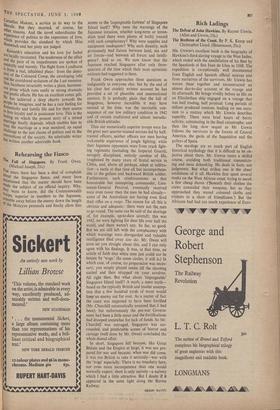Rehearsing the Fiasco
, 11 Years there has been a deal of complaint about the Singapore fiasco, and many have maintained that the matter should have been eli_ade the subject of an official inquiry. Why, they want to know, did the Commonwealth i,n 15°1)s, superior in numbers to the Japanese, crumble away before the enemy down the length 0 the Malayan peninsula and finally allow him
access to the 'impregnable fortress' of Singapore Island itself? Why were the warnings of the Japanese invasion, whether long-term or imme- diate (and there were plenty of both), treated with such complacency? Why were supplies and equipment inadequate? Why such disunity. such grotesquely bad liaison between land, sea and air forces—and between all forces and intelli- gence? And so on. We now know that the Japanese reached Singapore after only three- quarters of the time which their most optimistic estimate had suggested to them.
Frank Owen approaches these questions as indignantly as everyone else; but by the end of his clear but crudely written account he has provided a set of plausible and unsensational answers. It is perfectly plain that the fall of Singapore, however incredible it may have seemed at the time, was the inevitable con- sequence of our low military condition in 1942 and of certain traditional and almost ineradic- able British attitudes.
Thus our numerically superior troops were for the great part quarter-trained novices led by half- trained officers, peither officers nor men having reckonable experience of jungle fighting; while their Japanese opponents were from crack fight- ing regiments (including the Imperial Guard), savagely disciplined, entirely careless of life, toughened by many years of brutal service in China, and, above all perhaps, adept at infiltra- tion—a tactic at that time all but incomprehens- ible to the gallant and backward British soldier.
Furthermore, such reinforcements as that honourable but uninspiring commander, Lieu- tenant-General Percival, eventually received
were even rawer than the men he had already— some of the Australians not having even fired their rifles on a range. The reason for all this is
obvious and adequate : there were not the men to go round. The same can be said of the shortage of, for example, up-to-date aircraft; this was 1942, we were fighting for dear life over half the world, and there weren't any. So far, so good. But we are still left with the complacency with which warnings were disregarded and valuable
intelligence filed away sine die. Mr. Owen will soon set you straight about this, and I can only
agree with his findings. It was, at that time, an
article of faith that white men just could not be beaten by 'wogs.' (In some circles, it still is.) In
which case, of course, no preparation was neces- sary; you simply played tennis till the shooting started and then strapped on your revolver.
All right then. But what about 'impregnable' Singapore Island itself? A myth, a mere myth— based on the typically British and insular assump- tion that a few hundred yards of water would keep an enemy out for ever. As a matter of fact the coast was supposed to have been fortified (Mr. Churchill automatically assumed that it had been); but unfortunately the pre-war Govern- ment had been a little mean and the fortifications had drooped somewhat for lack of funds. So Mr. Churchill was outraged, Singapore was sur- rounded, and predictable scenes of horror and carnage (well done by Mr. Owen) concluded the whole dismal affair.
In short, Singapore fell because, like Great Britain and the Empire at large, it was not pre- pared for war and because, when war did come, it was too British to take it seriously—war with the 'wogs' especially. There is no treachery here,
nor even more incompetence than one would normally expect; there is only naivety—a naivety which I find a little attractive. But I doubt if it appeared in the same light along the Burma Railway.
SIMON RAVEN


































 Previous page
Previous page